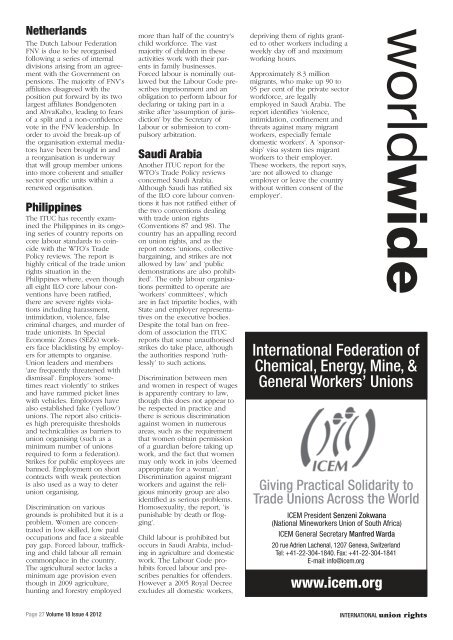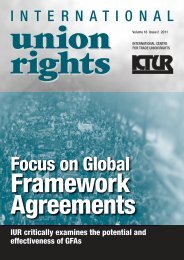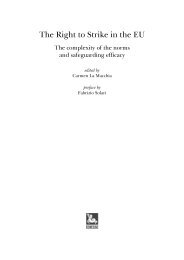International Centre for Trade Union Rights
International Centre for Trade Union Rights
International Centre for Trade Union Rights
You also want an ePaper? Increase the reach of your titles
YUMPU automatically turns print PDFs into web optimized ePapers that Google loves.
Netherlands<br />
The Dutch Labour Federation<br />
FNV is due to be reorganised<br />
following a series of internal<br />
divisions arising from an agreement<br />
with the Government on<br />
pensions. The majority of FNV’s<br />
affiliates disagreed with the<br />
position put <strong>for</strong>ward by its two<br />
largest affiliates Bondgenoten<br />
and AbvaKabo, leading to fears<br />
of a split and a non-confidence<br />
vote in the FNV leadership. In<br />
order to avoid the break-up of<br />
the organisation external mediators<br />
have been brought in and<br />
a reorganisation is underway<br />
that will group member unions<br />
into more coherent and smaller<br />
sector specific units within a<br />
renewed organisation.<br />
Philippines<br />
The ITUC has recently examined<br />
the Philippines in its ongoing<br />
series of country reports on<br />
core labour standards to coincide<br />
with the WTO’s <strong>Trade</strong><br />
Policy reviews. The report is<br />
highly critical of the trade union<br />
rights situation in the<br />
Philippines where, even though<br />
all eight ILO core labour conventions<br />
have been ratified,<br />
there are severe rights violations<br />
including harassment,<br />
intimidation, violence, false<br />
criminal charges, and murder of<br />
trade unionists. In Special<br />
Economic Zones (SEZs) workers<br />
face blacklisting by employers<br />
<strong>for</strong> attempts to organise.<br />
<strong>Union</strong> leaders and members<br />
‘are frequently threatened with<br />
dismissal’. Employers ‘sometimes<br />
react violently’ to strikes<br />
and have rammed picket lines<br />
with vehicles. Employers have<br />
also established fake (‘yellow’)<br />
unions. The report also criticises<br />
high prerequisite thresholds<br />
and technicalities as barriers to<br />
union organising (such as a<br />
minimum number of unions<br />
required to <strong>for</strong>m a federation).<br />
Strikes <strong>for</strong> public employees are<br />
banned. Employment on short<br />
contracts with weak protection<br />
is also used as a way to deter<br />
union organising.<br />
Discrimination on various<br />
grounds is prohibited but it is a<br />
problem. Women are concentrated<br />
in low skilled, low paid<br />
occupations and face a sizeable<br />
pay gap. Forced labour, trafficking<br />
and child labour all remain<br />
commonplace in the country.<br />
The agricultural sector lacks a<br />
minimum age provision even<br />
though in 2009 agriculture,<br />
hunting and <strong>for</strong>estry employed<br />
more than half of the country's<br />
child work<strong>for</strong>ce. The vast<br />
majority of children in these<br />
activities work with their parents<br />
in family businesses.<br />
Forced labour is nominally outlawed<br />
but the Labour Code prescribes<br />
imprisonment and an<br />
obligation to per<strong>for</strong>m labour <strong>for</strong><br />
declaring or taking part in a<br />
strike after ‘assumption of jurisdiction’<br />
by the Secretary of<br />
Labour or submission to compulsory<br />
arbitration.<br />
Saudi Arabia<br />
Another ITUC report <strong>for</strong> the<br />
WTO’s <strong>Trade</strong> Policy reviews<br />
concerned Saudi Arabia.<br />
Although Saudi has ratified six<br />
of the ILO core labour conventions<br />
it has not ratified either of<br />
the two conventions dealing<br />
with trade union rights<br />
(Conventions 87 and 98). The<br />
country has an appalling record<br />
on union rights, and as the<br />
report notes ‘unions, collective<br />
bargaining, and strikes are not<br />
allowed by law’ and ‘public<br />
demonstrations are also prohibited’.<br />
The only labour organisations<br />
permitted to operate are<br />
‘workers’ committees’, which<br />
are in fact tripartite bodies, with<br />
State and employer representatives<br />
on the executive bodies.<br />
Despite the total ban on freedom<br />
of association the ITUC<br />
reports that some unauthorised<br />
strikes do take place, although<br />
the authorities respond ‘ruthlessly’<br />
to such actions.<br />
Discrimination between men<br />
and women in respect of wages<br />
is apparently contrary to law,<br />
though this does not appear to<br />
be respected in practice and<br />
there is serious discrimination<br />
against women in numerous<br />
areas, such as the requirement<br />
that women obtain permission<br />
of a guardian be<strong>for</strong>e taking up<br />
work, and the fact that women<br />
may only work in jobs ‘deemed<br />
appropriate <strong>for</strong> a woman’.<br />
Discrimination against migrant<br />
workers and against the religious<br />
minority group are also<br />
identified as serious problems.<br />
Homosexuality, the report, ‘is<br />
punishable by death or flogging’.<br />
Child labour is prohibited but<br />
occurs in Saudi Arabia, including<br />
in agriculture and domestic<br />
work. The Labour Code prohibits<br />
<strong>for</strong>ced labour and prescribes<br />
penalties <strong>for</strong> offenders.<br />
However a 2005 Royal Decree<br />
excludes all domestic workers,<br />
depriving them of rights granted<br />
to other workers including a<br />
weekly day off and maximum<br />
working hours.<br />
Approximately 8.3 million<br />
migrants, who make up 90 to<br />
95 per cent of the private sector<br />
work<strong>for</strong>ce, are legally<br />
employed in Saudi Arabia. The<br />
report identifies ‘violence,<br />
intimidation, confinement and<br />
threats against many migrant<br />
workers, especially female<br />
domestic workers’. A ‘sponsorship’<br />
visa system ties migrant<br />
workers to their employer.<br />
These workers, the report says,<br />
‘are not allowed to change<br />
employer or leave the country<br />
without written consent of the<br />
employer’.<br />
worldwide<br />
<strong>International</strong> Federation of<br />
Chemical, Energy, Mine, &<br />
General Workers’ <strong>Union</strong>s<br />
Giving Practical Solidarity to<br />
<strong>Trade</strong> <strong>Union</strong>s Across the World<br />
ICEM President Senzeni Zokwana<br />
(National Mineworkers <strong>Union</strong> of South Africa)<br />
ICEM General Secretary Manfred Warda<br />
20 rue Adrien Lachenal, 1207 Geneva, Switzerland<br />
Tel: +41-22-304-1840. Fax: +41-22-304-1841<br />
E-mail: info@icem.org<br />
www.icem.org<br />
Page 27 Volume 18 Issue 4 2012<br />
INTERNATIONAL union rights





